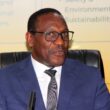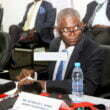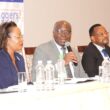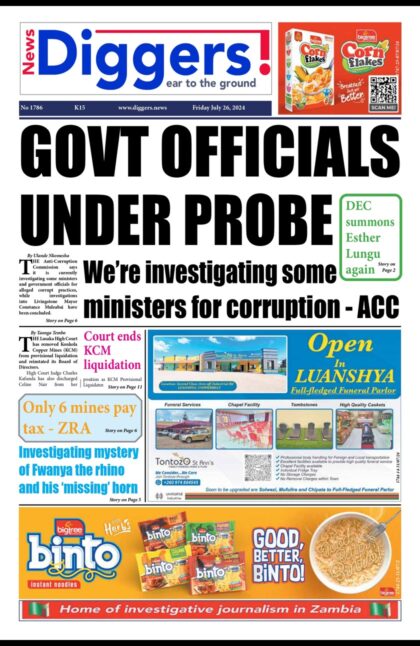The South African Parliament has heard how Zesco owes that country’s power utility Eskom a debt amounting to R89 million for the importation of power in 2018.
And Chief Government Spokesperson Dora Siliya has conceded that government is struggling to come up with the required US$32 million balance to enable Zesco start the importation of power which is expected to reduce the load-shedding.
According to data obtained from the South Africa’s Parliament, South Africa’s Public Enterprises Minister Pravin Gordhan revealed that Zesco was cited among two other power utilities in the SADC region that still owed Eskom
In reply to a Democratic Alliance (DA) Parliamentary question, Gordhan explained that Eskom was owed R632 million in outstanding payments by three foreign state-owned power utilities.
“Zesco Zambia (owes) Eskom R89 million due to power supplied during the previous drought period. The country has economic challenges, which have led to it being unable to honour its debt obligations. Eskom owes Zesco for energy imbalance, which arises out of managing the regional system. Eskom and Zesco are currently concluding a payment plan agreement for the settlement of the debt,” Gordhan stated.
“ZESA Zimbabwe (owes) R322 million. Zimbabwe has economic challenges due to political challenges, which have led to it being unable to honour its debt obligations. Eskom and ZESA currently have a payment plan agreement for the settlement of the debt and ZESA is paying off the debt as per the agreement. Electricidade de Mocambique (EDM) [owes] R221 million Eskom supplies EDM with standby power. The utility has financial constraints due to their generation mix which includes IPP’s which are contracted on a take-or-pay basis.”
And DA opposition chief whip Natasha Mazzone wondered why Eskom was incapable of collecting debts owed to the utility.
“In addition to this half a billion rand owed by foreign governments, the power utility is also owed close to R20 billion in outstanding debt from municipalities across the country. Clearly, Eskom is incapable of collecting debts both at home and abroad. This begs the question: does Eskom actually have plans in place to collect debts owed to it? If not, the utility will never be able to stabilise its cash flow, and the taxpayer will continue to pay for bailout after bailout,” stated Mazzone.
“The Minister has cited economic and political challenges as well as financial constraints as reasons for the non-payment However, at the end of the day, it is inconceivable that Eskom is willing to hold South Africans to ransom with the burden of rolling blackouts, while it is supplying electricity to foreign governments who are not even paying for it! With the threat of rolling blackouts ever present, Eskom should first meet its obligations here at home before it can ever think of over-extending itself through power supplies to other countries. It is also telling that the foreign governments, which are failing to settle their Eskom debts, are governments with close ties to the ANC. The DA warns the governing party against allowing its mindless pursuit of regional solidarity to push Eskom further to the brink of collapse.”
Meanwhile, Speaking during a press briefing in Lusaka, Wednesday, Siliya admitted that government was struggling to raise the US $32 million balance after paying US$10 million to Eskom for a new importation contract.
Siliya told journalists, who demanded an update on the latest emergency power imports that were promised by Energy Minister Mathew Nkhuwa two weeks ago, that the Minister was camped at the Ministry of Finance lobbying for funds to secure the much-needed electricity.
“We did invite the Minister of Energy to be here today precisely for that reason; he’s currently at the Ministry of Finance this (Wednesday) morning for a meeting. You will recall that the amount was US$42 million for two months from Eskom, and he did state at that point that the following day, US$10 million was going to be paid, that was done, and he’s still trying to discuss with the Ministry of Finance on the balance so that we can begin to get this power,” Siliya said.
“We are having financial challenges as a country and that’s why we have only paid, as of now, US $10 million as the Minister had promised, and was hoping that in these two weeks, we would’ve had the balance of US $32 million; we don’t have it yet. Remember, he did say that he was hoping to get this money from ZRA, NAPSA and other institutions within government because this is the money for the people of Zambia. I heard one of the opposition leaders was saying, ‘where is government going to get the money?’ We have to find it, and it means something else will suffer!”
She also said Zesco was almost grounded to a halt owing to its escalating operational and financial challenges.
“It just not attainable that we can be producing power at 11 cents per kilowatt hour, and we want to pay for it as seven cents, it just doesn’t make sense, and that’s why Zesco has ground to a halt because there’s no liquidity; all of us have been subsidized by Zesco! That’s a long-term solution. But what do we do now? Many of us have to migrate from Zesco power to other sources; it is just the future, we have to use gas, solar, we have to use inverters so that we reduce the burden on Zesco,” said Siliya.
“So, to cut (a long) story short; we are still looking for the money.”









2 Responses
Mr Mazzone from the DA all he can think of is his stomach. My question is was he there when uncle Mandela was languishing? If all the African Leaders of that time could think like Mr Mazzone where would all of us be today?
Mr Mazzone grow., You are a leader in Africas greatest nation; empathy is all ask.
Let s have another day of prayers, since we can’t see our mismanagement in the national affairs!! And any one who tries to advise is deemed to be bitter and politicizing the situation!!